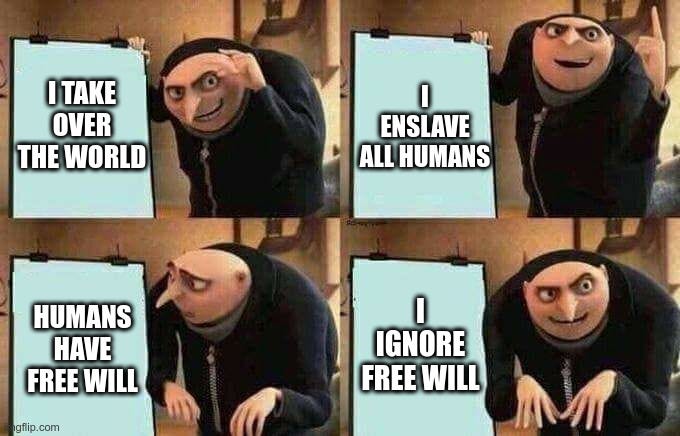God Controls... Everything?
Let's clarify what we mean
In him we have obtained an inheritance, having been predestined according to the purpose of him who works all things according to the counsel of his will.
Ephesians 1:11 (ESV)
The Christian Bible says that God is in charge of the world.
But what does that mean?
There has been a surprising amount of debate over that question over the years. There has equally been a lot of misunderstanding.
In this post, I will try to add some clarity.
I will offer two simple descriptions of the strongest view you can hold on this issue, which is also my own view:1
God is in charge of and controls every aspect of reality, without exception.
I will then use each of those descriptions as a framework to compare differing views.
Description #1
My first description of the strongest view you can hold on this issue is actually a question-answer pair:
Question: What is the fundamental reason that x happened?
Answer: God decreed that x would happen.
This pair can be used in the following manner: if someone is happy to replace x with anything in Creation, then they believe that God is fully in charge and in control of everything.
Examples
By way of examples:
Q: What is the fundamental reason that the universe exists? A: God decreed that the universe would exist.
Q: What is the fundamental reason that you were born? A: God decreed that I would be born.
Q: What is the fundamental reason that you got out of bed this morning? A: God decreed that I would get out of bed this morning.
Q: What is the fundamental reason that you became a Christian? A: God decreed that I would become a Christian.
Q: What is the fundamental reason that Adam disobeyed God? A: God decreed that Adam would disobey him.
Q: What is the fundamental reason that evil things happen in the world? A: God decreed that evil things would happen in the world.
These examples have been listed in increasing order of controversy. While most Christians would agree with the first question-answer pair, some Christians might feel uncomfortable with pair number 4. Even more Christians might be uncomfortable with pair number 6. Yet, if you believe that God is truly in charge and in control of everything, I believe that you will agree with every example above.
Objecting Views
Discomfort with one or more of the statements above can be expressed in many ways. For example, discomfort with example 4 could be expressed as:
'While I believe that God is in charge of me being a Christian, the fundamental reason I became a Christian was because I chose to do it.'2
'God always knew that I would become a Christian but I made the decision for it to happen. God just knew beforehand what I would choose.'3
'God doesn't know what someone will choose and he does not control it.'4
What is common to all these objections is that they deny God's decree as the fundamental reason that something happened. God's decree might be a secondary reason (the first objection) or it might not be a reason at all (second and third objections).
Description #2
Another way to illustrate the view that God is fully in charge and in control of everything is to use a diagram:
The arrow between the two circles means 'causes' or 'is the reason that'.
Example
The advantage of using a diagram is that we can also show more complex situations. For example, many Christians would say: 'I chose to follow Jesus because God changed my heart'. As a diagram, this could be represented (according to the view that God is fully in charge) as:
This diagram helps illustrates God's decree as the fundamental reason for someone choosing to follow Jesus. It also shows how secondary reasons can come into play (in this example, the change of heart).5
Objection 1
Meanwhile, the first objecting view in the preceding section could be represented as:
'While I believe that God is in charge of me being a Christian, the fundamental reason I became a Christian was because I chose to do it.'
According to this view, God's sovereignty becomes a secondary reason while my choice to follow Jesus is the fundamental reason I am a Christian. As a corollary, this view also means that God would not be in charge of me being a Christian, unless I had first chosen to be a Christian.
Objection 2
The second objection from the preceding section could be represented as:
'God always knew that I would become a Christian but I made the decision for it to happen. God just knew beforehand what I would choose.'
Here God's knowledge is not a reason for anything that happened. It exists separately from the core event of my choice to follow Jesus and my becoming a Christian.
Objection 3
The third objection from above could be represented in the following way:
'God doesn't know what someone will choose and he does not control it.'
According to this view, God plays no part in (he does not know or act) when I choose to become a Christian. Rather, the act is autonomous and happens apart from him.
Conclusion
While our understanding of things can always be improved, sometimes a simple model can really help clarify what our thinking is (and what it is not).
It is my hope that the above descriptions and examples are helpful in bringing greater clarity to our discussions about God's rule over the world.
Thoughtful Reformed
This view has traditionally been called 'Reformed'.
This view has traditionally been called 'Arminianism'.
This view has traditionally been called 'Molinism'.
This view has more recently been called 'Open Theism'.
A more complete diagram would draw an additional arrow from God's decree to the choice of following Jesus, since God decrees all things.







